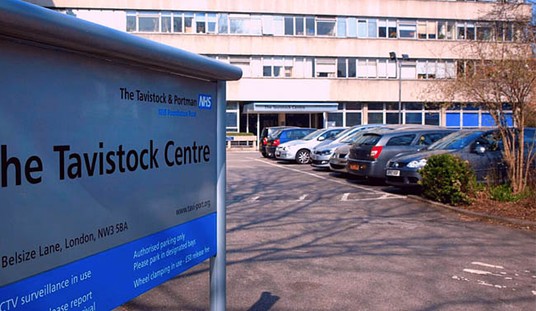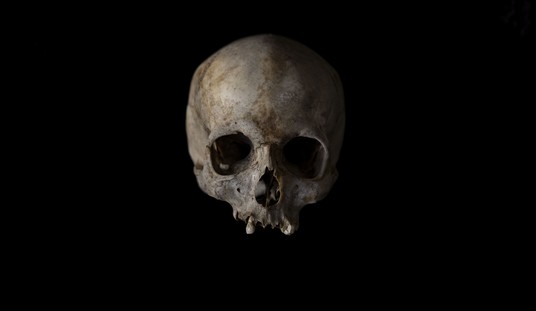Just across at SCOTUS Blog. 5-4, which means Kennedy was the deciding vote — or, if you prefer, Alito was the deciding vote. Would O’Connor or Harriet Miers have voted the same way? If nothing else, Bush at least delivered this.
Stand by for the opinion.
Update: The first AP report says the right extends to “self-defense and hunting.” And here’s an update. Hmmm:
The court’s 5-4 ruling strikes down the District of Columbia’s 32-year-old ban on handguns as incompatible with gun rights under the Second Amendment. The decision goes further than even the Bush administration wanted, but probably leaves most firearms laws intact.
Update: Here’s the opinion at SCOTUS Blog. They’re getting hammered by Drudge so e-mail us if you can’t access it there and I’ll upload it elsewhere.
Update: A key passage from the syllabus. If you had your eye on a machine gun, think again:
Like most rights, the Second Amendment right is not unlimited. It is not a right to keep and carry any weapon whatsoever in any manner whatsoever and for whatever purpose: For example, concealed weapons prohibitions have been upheld under the Amendment or state analogues. The Court’s opinion should not be taken to cast doubt on longstanding prohibitions on the possession of firearms by felons and the mentally ill, or laws forbidding the carrying of firearms in sensitive places such as schools and government buildings, or laws imposing conditions and qualifications on the commercial sale of arms. Miller’s holding that the sorts of weapons protected are those “in common use at the time” finds support in the historical tradition of prohibiting the carrying of dangerous and unusual weapons.
Also from the syllabus: “Because Heller conceded at oral argument that the D. C. licensing law is permissible if it is not enforced arbitrarily and capriciously, the Court assumes that a license will satisfy his prayer for relief and does not address the licensing requirement.”
Update: According to How Appealing, Scalia’s opinion cites no fewer than three law review articles written by Eugene Volokh.
Update: The first 50+ pages are devoted to historical analysis. Skip down to section III on page 54 for a discussion of limitations on the right. Here’s the whole thing, with citations omitted, for ease of reference:
Like most rights, the right secured by the Second Amendment is not unlimited. From Blackstone through the 19th-century cases, commentators and courts routinely explained that the right was not a right to keep and carry any weapon whatsoever in any manner whatsoever and for whatever purpose… For example, the majority of the 19th-century courts to consider the question held that prohibitions on carrying concealed weapons were lawful under the Second Amendment or state analogues… Although we do not undertake an exhaustive historical analysis today of the full scope of the Second Amendment, nothing in our opinion should be taken to cast doubt on longstanding prohibitions on the possession of firearms by felons and the mentally ill, or laws forbidding the carrying of firearms in sensitive places such as schools and government buildings, or laws imposing conditions and qualifications on the commercial sale of arms.
We also recognize another important limitation on the right to keep and carry arms. Miller said, as we have explained, that the sorts of weapons protected were those “in common use at the time.”… We think that limitation is fairly supported by the historical tradition of prohibiting the carrying of “dangerous and unusual weapons.”… It may be objected that if weapons that are most useful in military service—M-16 rifles and the like—may be banned, then the Second Amendment right is completely detached from the prefatory clause. But as we have said, the conception of the militia at the time of the Second Amendment’s ratification was the body of all citizens capable of military service, who would bring the sorts of lawful weapons that they possessed at home to militia duty. It may well be true today that a militia, to be as effective as militias in the 18th century, would require sophisticated arms that are highly unusual in society at large. Indeed, it may be true that no amount of small arms could be useful against modern-day bombers and tanks. But the fact that modern developments have limited the degree of fit between the prefatory clause and the protected right cannot change our interpretation of the right.
So as I understand this, you have a right to own a handgun, a shotgun, a rifle or some other weapon you’d buy either for home defense or hunting, since that’s how a colonial-era militia operated. (Live by the originalist sword, die by the originalist sword.) I’ll have to check the regulations, but offhand I don’t think this is much different from how the system works now in New York City: As I recall, they make you pay a $500 fee but they won’t reject your handgun application unless they have some sort of good cause.
What about the boldfaced part having to do with concealed carry “in sensitive places,” though? Does that mean you have a right to carry in non-sensitive places?
Update: SCOTUS Blog notes that the opinion doesn’t explicitly say that this ruling applies to the states. The gun ban being challenged was from D.C., a federal jurisdiction, so in theory there’s now an open subsidiary question of whether the Second Amendment was “incorporated” by the Fourteenth Amendment to apply against the states as well. Don’t expect anyone to make a big deal of it, though: Almost all other rights in the Bill of Rights have already been “incorporated” and the logic of the decision here doesn’t lend itself to any obvious distinction between the feds and the states.
Update: The obligatory applause from McCain:
Today’s decision is a landmark victory for Second Amendment freedom in the United States. For this first time in the history of our Republic, the U.S. Supreme Court affirmed that the Second Amendment right to keep and bear arms was and is an individual right as intended by our Founding Fathers. I applaud this decision as well as the overturning of the District of Columbia’s ban on handguns and limitations on the ability to use firearms for self-defense.
“Unlike Senator Obama, who refused to join me in signing a bipartisan amicus brief, I was pleased to express my support and call for the ruling issued today. Today’s ruling in District of Columbia v. Heller makes clear that other municipalities like Chicago that have banned handguns have infringed on the constitutional rights of Americans. Unlike the elitist view that believes Americans cling to guns out of bitterness, today’s ruling recognizes that gun ownership is a fundamental right — sacred, just as the right to free speech and assembly.
This ruling does not mark the end of our struggle against those who seek to limit the rights of law-abiding citizens. We must always remain vigilant in defense of our freedoms. But today, the Supreme Court ended forever the specious argument that the Second Amendment did not confer an individual right to keep and bear arms.
Update: Here are the New York City gun regs. Scalia emphasizes on pages 58-59 that they’re not ruling on the D.C. licensing scheme; cities can still make you register after today, although there are bound to be lawsuits now challenging each distrinct’s licensing requirements. As I suspected, in NYC you can basically own a gun for home use as a matter of right if you provide a birth certificate, prove you’re a citizen, pay the fee, and have a (relatively) clean criminal record. If you want to carry or to keep a gun at the workplace, you have to show “necessity.” Whether that’s still constitutional will be determined at a later date, which is why Geraghty’s point about the importance of having conservative judges on the bench to fill in the blanks of this ruling going forward is important.
Update: I must be misreading the regs because this New York Sun piece from March says the NYPD has discretion to deny handgun licenses. In all cases, though? Even to a law-abiding citizen for home use? Not anymore, in any event.
Update: The quote of the day comes not from Scalia but from Stevens in dissent:
The Court properly disclaims any interest in evaluating the wisdom of the specific policy choice challenged in this case, but it fails to pay heed to a far more important policy choice—the choice made by the Framers themselves. The Court would have us believe that over 200 years ago, the Framers made a choice to limit the tools available to elected officials wishing to regulate civilian uses of weapons, and to authorize this Court to use the common-law process of case-by-case judicial lawmaking to define the contours of acceptable gun control policy. Absent compelling evidence that is nowhere to be found in the Court’s opinion, I could not possibly conclude that the Framers made such a choice.
Yeah, that’s … the whole scheme of the Constitution, isn’t it? To limit the power of government? Or does that principle only apply to Article II anymore?
Update: Here’s a shrewd piece from TNR back in March predicting that the decision won’t make much of a difference except in the most gun-grabby districts. Quote: “For all but the hardest-core gun lovers, prudence and public safety ultimately limit libertarianism–and the justices don’t seem inclined to dive off a cliff and read the amendment so as to permit individual ownership of upper-end military hardware… Outside of Washington D.C., in other words, a revitalized Second Amendment would largely forbid what nobody was seriously contemplating anyway: bans on common weapons for the recreational and self-protective uses of law-abiding people.” Yeah, if even the laws in New York City are already (mostly) consonant with the decision, then it’s not some huge game-changer in practice — yet. With the coming blue tide in November, though, who knows? It’s nice to have it on the books before anyone gets any ideas.
Update: Be sure to read Geraghty’s post about Obama’s history with gun control, before he was deciding that statements on the subject by his campaign were “inartful.” A lefty friend sent me the link to the ABC story this morning about that with a note saying, “Didn’t he sit on some gun-control organization’s board?” So he did.
Obama was named a director of the Joyce Foundation in late 1994, and remained in that position until late 2002.
During Obama’s tenure with the Joyce Foundation, donations to anti-gun groups increased dramatically. For example, in 1997 and 1998 the Violence Policy Center received $221,000 and $360,000 from the Foundation; those grants and donations increased to $1 million in 2000 and $800,000 in 2002. In all, during Obama’s tenure, the group received $15 million from the Joyce Foundation…
Lest anyone think I’m mischaracterizing their objective analysis, note that their web site touts themselves as “the most aggressive group in the gun control movement.” Also note studies like their one from 2000 entitled, “Unsafe in Any Hands: Why America Needs to Ban Handguns,” which declared the idea that the Constitution would forbid a national handgun ban a “pure myth.” Also note the organization’s subtly-titled book, Every Handgun is Aimed at You: The Case for Banning Handguns.)
Update: Politico claims St. Barack’s reversal on the “inartful” statement his spokesman made last November about supporting the D.C. ban is more recent than thought. Ben Smith doesn’t offer a date but says this came around the time of the Potomac Primary, i.e. early February:
LH: One other issue that is of great importance to the people of the district here, is gun control. You said in Idaho here, recently, that “I have no intention of taking away folks’ guns.” But you support the D.C. handgun ban, and you’ve said that it’s constitutional. How do you reconcile those two positions?
BO: Because I think we have two conflicting traditions in this country. I think it’s important for us to recognize that we’ve got a tradition of handgun ownership and gun ownership generally. And a lot of people – law-abiding citizens use if for hunting, for sportsmanship, and for protecting their families. We also have a violence on the streets that is the result of illegal handgun usage. And so I think there is nothing wrong with a community saying we are going to take those illegal handguns off the streets, we are going to trace more effectively, how these guns are ending up on the streets, to unscrupulous gun dealers, who often times are selling to straw purchasers. And cracking down on the various loopholes that exist in terms of background checks for children, the mentally ill. Those are all approaches that I think the average gun owner would actually support. The problem is, that we’ve got a position, often times by the NRA that says any regulation whatsoever is the camel’s nose under the tent. And that, I think, is not where the American people are at. We can have reasonable, thoughtful gun control measure that I think respect the Second Amendment and people’s traditions.







Join the conversation as a VIP Member